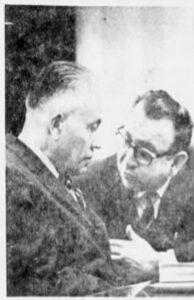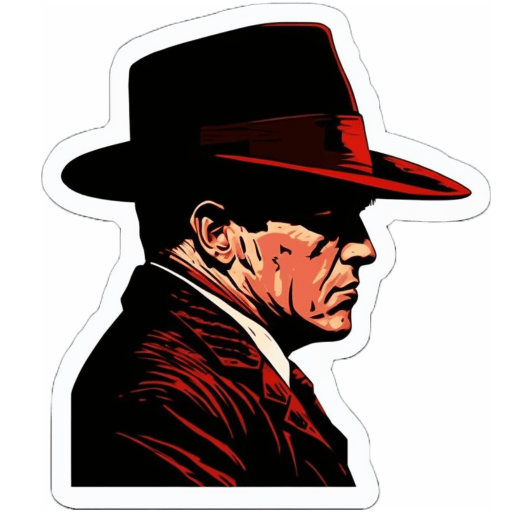 January 23, 1968 – Judge Robert H. Gollmar ruled that Gein could understand the proceedings against him and would stand trial. Gollmar named Frinzi as co-counsel for Gein, along with attorney William N. Belter.
January 23, 1968 – Judge Robert H. Gollmar ruled that Gein could understand the proceedings against him and would stand trial. Gollmar named Frinzi as co-counsel for Gein, along with attorney William N. Belter.
January 25, 1968: The Capital Times sent reporter Irvin Kreisman to Wautoma and the common refrain he heard was that people were upset the Gein case was back. One man said he would contribute a 30.06 bullet, and another man chimed in that he would buy Gein a new suit – to be buried in. One attorney said he was glad the judge gave the case to Frinzi – he would not want to live and raise a family in the community while defending Gein. The headline of the article was, “Gein Case: Why Dig it Up?” Some copy editor had a sick sense of humor.
February 21, 1968: At a preliminary hearing, Gein was bound over for trial on robbery and murder charges. He was accused of killing Bernice Worden and stealing the cash register from her hardware store in November 1957. Worden’s remains were found in Gein’s barn. At least one dozen other human remains were found, believed to have been dug up from graves. Pre-trial motions were scheduled for April 10.
At the hearing, Frinzi tried unsuccessfully to block testimony from Joseph C. Wilimovsky of the State Crime Lab that Gein had admitted the crime. Frinzi said at the time the “confession” was made, Gein had not been advised of his rights against self-incrimination. The government said that the confession came after Gein had been given an attorney, so no rights were violated.
(Judge Andrew Cotter of Marquette County oversaw the prelim because Waushara County Judge Boyd Clark had been present during the interrogation of Gein in 1957.)
Between the preliminary hearing and trial, Gein was held at the county jail in Oshkosh. It was believed the security would be better there than in Wautoma, as Gein was a likely revenge target.
April 1968, the Wisconsin Supreme Court stepped in and said Gollmar would have to suspend trial until they held a hearing on points raised by Frinzi. The hearing was held, with Frinzi arguing with Assistant Attorney General Robert Sutton. Frinzi’s main concern was that the warrants against Gein were unconstitional because of changes made between 1957 and 1968, and should be thrown out. Specifically, the complaint against Gein came from a Waushara County DA, and the Supreme Court ruled in 1965 that DAs could not issue such warrants and complaints – magistrates could after a hearing. Sutton said they could be thrown out, but it would be pointless because he would just refile the charges now that Gein was competent. Frinzi countered, saying the murder charge could be refiled but the robbery charge would have passed the statute of limitations. Justice Bruce Beilfuss interjected, saying the statute of limitations does not apply if someone was in a mental institution and the clock would have started in January 1968, not in 1957. In short, the trial would go forward.
At the local level, Frinzi filed a motion to get the confession thrown out. Whether an attorney was present or not, Dr. Edward Schubert of the Central State Hospital in Waupun had already testified that Gein had a very serious mental illness at the time of his arrest – he was in no condition to make any statements. Frinzi also found three former deputies to testify that the sheriff punched Gein and shoved him into the wall during the interrogation. Gollmar said he would decide before trial.
October 8, 1968: Judge Gollmar threw out Gein’s confession. He said it was problematic for four reasons: Gein had not properly received Miranda rights. He was “brutally attacked” by Sheriff Arthur Schley during the interrogation. The interrogration was done over too long of a time (many, many hours). And Gein was mentally ill.
November 8, 1968: The state rested its case. Gein had the body in his shed, and his fingerprints and palm prints were on the .22 rifle that matched the bullet that killed Worden. Frinzi filed a motion to have the robbery charge dismissed – he said that the state made no effort to show the cash register found at Gein’s house had come from the Worden hardware store. Judge Gollmar agreed and dropped that charge as the trial switched to the defense stage.
The defense admitted that Gein had clearly caused the death of Worden, but the evidence of first-degree murder was weak. According to Gein, he examined the rifle in the hardware store, it accidentally went off, and killed Worden. At this point he blacked out because he had an irrational fear of blood. Frinzi said manslaughter or second-degree homicide might be warranted, but they could not show there was any malice or intent in the crime. Judge Gollmar, who was hearing the case without a jury, thought it over.
(Gein was found guilty, and then declared insane… he spent the rest of his life in the asylum.)
